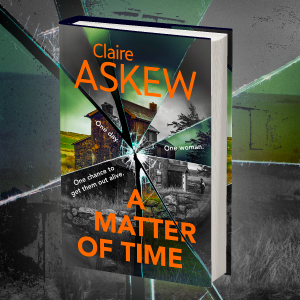A Matter of Time – Free Extract
A sneak preview of A Matter of Time by Claire Askew…

A Matter of Time is out this Thursday 10th March and available here.
Cleaning the shotgun was a ritual he’d always loved. As a boy, he used to stand in the doorway of the barn and watch his father do it, never allowed closer than the threshold because his mother feared guns and wanted him to fear them, too. But the shotgun – its barrel a pillar of trapped light by the time his father was done with it – held no fear, only fascination. When he was fifteen, his mother gave in, and although he’d already held it many times without her knowing – sneak- ing the key to the gun cupboard whenever he could – he was allowed to work and shoot and clean the shotgun for himself. His father once remarked that he’d a skill with it, and in his teens he’d basked for as long as he could in the compliment’s rare, awkward glow.
Every week he cleaned the gun, normally on a Saturday morning. In winter he’d sit under the kitchen light, clapping a little heat into his hands before he could start. But now it was June, the early sun already warming the scabbed tabletop, the hawthorn stand outside a riot of dawn chorus. It was only Friday, but he couldn’t wait another day. This thing had to be done.
The cleaning kit had also been his father’s, and each time he undid the leather roll and spread the tools out, he caught a snatch of the old barn’s smell. These were the same rods, worn smooth at the ends by his father’s hands, though the jags and brushes and mops he’d mostly replaced. The brass jag threw sparks of sunlight as he set up the rod, arranged the oils and lubricants, then opened up the gun. The sting of cold metal on his fingertips. His father had left him this beautiful object, and though that was years ago, he still couldn’t quite think of it as only his. He’d be sixty himself, soon, and no one to pass it on to
– this gun as much a piece of him as his own right arm.
Yes, it had to be done. A gun was a tool; it practically asked to be used. He sprayed cleaner through each barrel, then waited, let it do its work. He’d been abandoned, he thought – and made a fool of, too. He put in the brush and worked it, felt it prickling away the smears of leaden dirt. The bristles came out sooty-looking: good. This clean needed to be thorough. He had no power left to get what he wanted, but that wasn’t an impediment. Few people dared to argue with a shotgun. This gun could open doors, extract apologies, where he could not. A shotgun demanded the utmost respect.
He mopped each barrel slowly, then cleaned the ejectors, dotting their motions with grease. The fore-end was pristine but he polished and greased it anyway, his pulse flicking up as he thought about what he must do. Not long now before he’d need to put on his boots, shoulder the gun, and walk out into the June morning.
The last thing was oil. Oil on the barrel and a rag to bring out its lethal shine. By the time he’d finished, his wrist ached with the rubbing down, and he could see his face reflected in the muzzle, glassy and dark. He reached for the cartridges automatically, then paused. The package made a smattering sound in his shaking hand. He always loaded the gun once it had been cleaned, always. Force of habit, he thought.
Now he looked down at the little vials of shot, their gold tops gleaming. This wasn’t what he wanted, was it? The shotgun was coming with him, but only as a threat: doors opened. Apologies extracted. Respect demanded. He wasn’t going to fire it. It wasn’t like that.
And yet. He thought again of his father, a man who never had to ask for anything more than once. Would this plan still be effective, with an unloaded gun? Would he still be able to say what he wanted, knowing the chambers were empty, and any threats he made were empty, too? His own hesitation made his cheeks burn, picturing his old man. What if his bluff was called? What if they didn’t do what he was asking? What if they laughed?
He fingered two cartridges up out of the box, and rolled them on his open palm. He almost laughed himself: what did it matter, after all? He wasn’t going to fire the gun. He wasn’t. That wasn’t in the plan.
He knew every inch of this shotgun by heart. Without look- ing – without witnessing himself – he checked the action, opened the chamber, and pushed the ammunition in.






